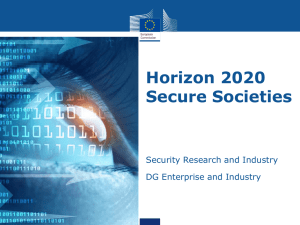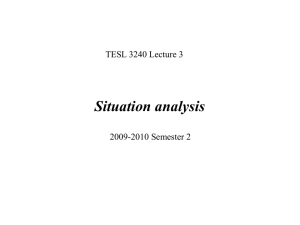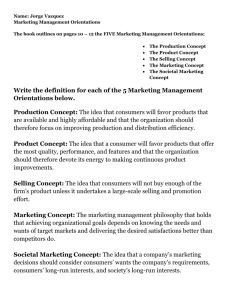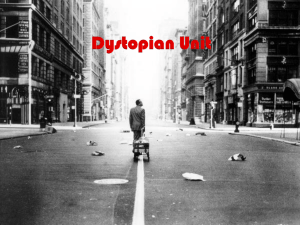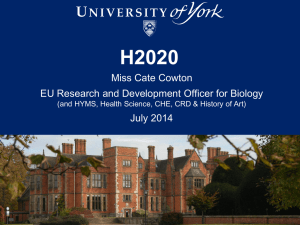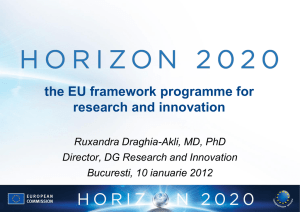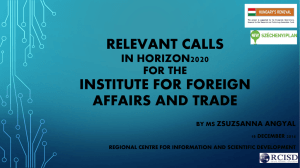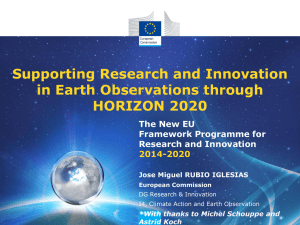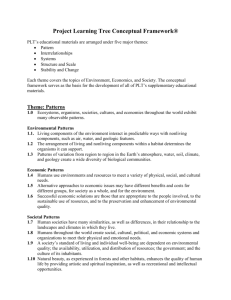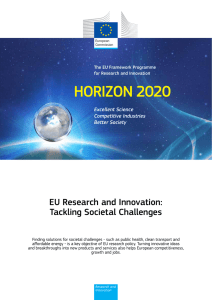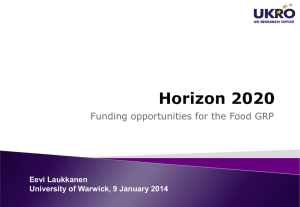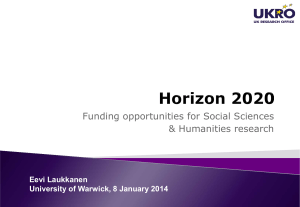Societal challenges Horizon 2020 reflects the policy priorities of the
advertisement
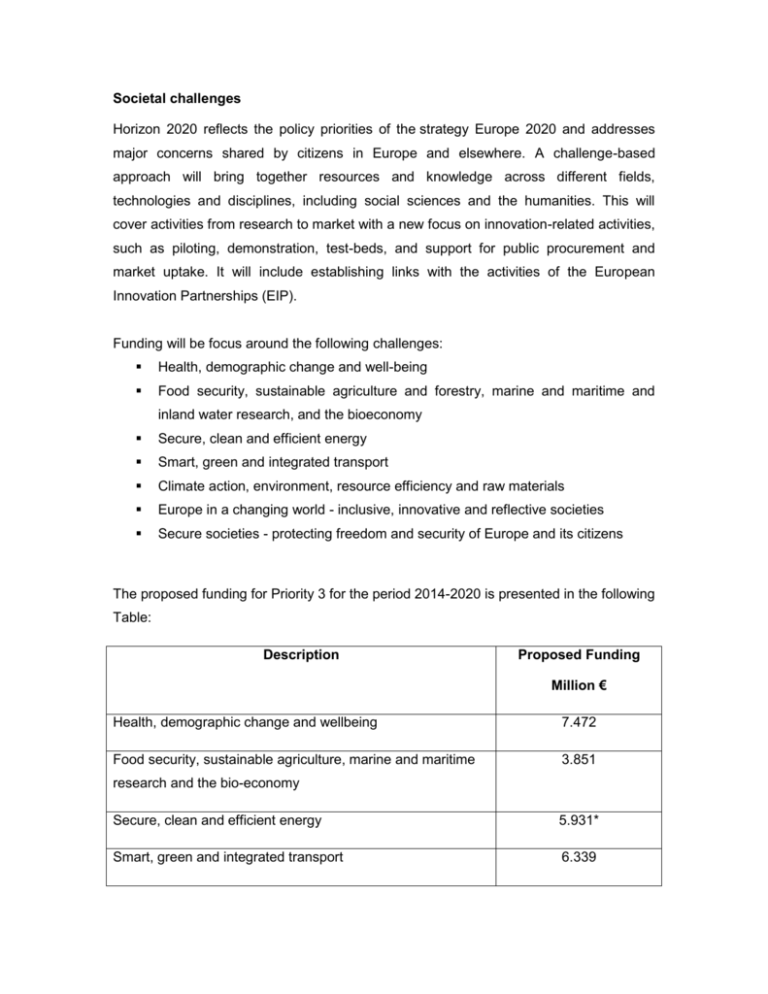
Societal challenges Horizon 2020 reflects the policy priorities of the strategy Europe 2020 and addresses major concerns shared by citizens in Europe and elsewhere. A challenge-based approach will bring together resources and knowledge across different fields, technologies and disciplines, including social sciences and the humanities. This will cover activities from research to market with a new focus on innovation-related activities, such as piloting, demonstration, test-beds, and support for public procurement and market uptake. It will include establishing links with the activities of the European Innovation Partnerships (EIP). Funding will be focus around the following challenges: Health, demographic change and well-being Food security, sustainable agriculture and forestry, marine and maritime and inland water research, and the bioeconomy Secure, clean and efficient energy Smart, green and integrated transport Climate action, environment, resource efficiency and raw materials Europe in a changing world - inclusive, innovative and reflective societies Secure societies - protecting freedom and security of Europe and its citizens The proposed funding for Priority 3 for the period 2014-2020 is presented in the following Table: Description Proposed Funding Million € Health, demographic change and wellbeing 7.472 Food security, sustainable agriculture, marine and maritime 3.851 research and the bio-economy Secure, clean and efficient energy 5.931* Smart, green and integrated transport 6.339 Climate action, resource efficiency and raw materials 3.081 Inclusive and reflective, secure societies 1.310 Secure Societies 1.695 Other Proposed Funding Million € Spreading excellence and widening participation 816 Science with and for society 462 European Institute of Innovation and Technology 3.180 1.903 Joint Research Centre (Non-nuclear direct actions) Health, Demographic Change and Wellbeing Activities under Societal Challenge 'Health, demographic change and wellbeing' aim to create opportunities for real breakthrough research and radical innovation, by supporting the translation of findings into the clinic and other health and care settings to improve health outcomes, reduce health inequalities and to promote active and healthy ageing. Work to be supported should improve our understanding of the causes and mechanisms underlying health, healthy ageing and disease; improve our ability to monitor health and to prevent, detect, treat and manage disease; support older persons to remain active and healthy; and test and demonstrate new models and tools for health and care delivery. Food Security, Sustainable Agriculture and Forestry, Marine and Maritime and Inland Water Research and the Bioeconomy Activities under Societal Challenge ‘Food security, sustainable agriculture and forestry, marine and maritime and inland water research and the bioeconomy’ aim at making the best of our biological resources in a sustainable way. The objective is to contribute to securing sufficient supplies of safe, healthy and high quality food and other bio-based products, by developing productive, sustainable and resource-efficient primary production systems, fostering related ecosystem services and the recovery of biological diversity, alongside competitive and low carbon supply chains. To achieve this objective, applicants are invited to find solutions which will make positive changes to our society, economy and environment, using resources more efficiently. In this respect, solutions should be found that cut across research and technological fields, with a strong innovation and market driven approach, in view of increasing growth and job creation. The involvement of end users including farmers, fishers, consumers, public authorities (including at local and regional levels) and society at large will be a key to achieve this. Secure, Clean and Efficient energy The activities included in the first Work Programme of the Horizon 2020 Energy Challenge contribute to the three focus areas "Energy Efficiency", "Competitive LowCarbon Energy" and "Smart Cities and Communities". These activities cover the full innovation cycle – from 'proof of concept' to applied research, pre-commercial demonstration and market uptake measures. They also exploit synergies with other relevant areas such as Information and Communication Technologies. In addition, the Energy Challenge contributes to the 'Blue Growth' focus area as well as to the Public Private Partnerships Energy-efficient Buildings and Sustainable Process Industries (SPIRE). An important novelty of this work programme is its challenge-based approach which gives applicants more freedom to come up with innovative solutions to the outlined challenges. As a consequence, topics are generally broader and allow a range of possible approaches, often encompassing more than one possible action. Smart, Green and Integrated transport The specific objective of the Transport Challenge ‘Smart, green and integrated transport’ is “to achieve a European transport system that is resource-efficient, climate- and environmentally-friendly, safe and seamless for the benefit of all citizens, the economy and society”. The Specific Programme is structured in four broad lines of activities aiming at: a) Resource efficient transport that respects the environment. The aim is to minimize transport's systems' impact on climate and the environment (including noise and air pollution) by improving its efficiency in the use of natural resources, and by reducing its dependence on fossil fuels. b) Better mobility, less congestion, more safety and security. The aim is to reconcile the growing mobility needs with improved transport fluidity, through innovative solutions for seamless, inclusive, affordable, safe, secure and robust transport systems. c) Global leadership for the European transport industry. The aim is to reinforce the competitiveness and performance of European transport manufacturing industries and related services including logistic processes and retain areas of European leadership (e.g. such as aeronautics). d) Socio-economic and behavioural research and forward looking activities for policy making. The aim is to support improved policy making which is necessary to promote innovation and meet the challenges raised by transport and the societal needs related to it. These activities are addressed in the Work Programme by three Calls for proposals: 1. Mobility for Growth 2. Green Vehicles 3. Small Business and Fast Track Innovation for Transport Climate Action, Environment, Resource Efficiency and Raw Materials Societal Challenge 5 “Climate Action, Environment, Resource Efficiency and Raw Materials” aims to achieve a resource – and water – efficient and climate change resilient economy and society. Furthermore, its objective is the protection and sustainable management of natural resources and ecosystems, and a sustainable supply and use of raw materials, in order to meet the needs of a growing global population within the sustainable limits of the planet's natural resources and ecosystems. Within this context, Actions and Topics in Societal Challenge 5 will address the knowledge base needed to understand changes in the environment, identify the policies, methods and tools that would most effectively tackle the above mentioned challenges, and support innovators and businesses to bring green solutions to the market. ‘Waste’ and ‘Water’ have been selected as particular priorities, on the grounds of their substantial potential for business opportunities and job creation while tackling important resource efficiency challenges. Europe in a Changing World – Inclusive, Innovative and Reflective Societies Europe is facing a number of important social, economic and political challenges. This Thematic Area will support actions that will give Europe a cutting edge and/or sufficient resilience in facing the current and future difficulties affecting its development. Therefore, the three basic aims set to fulfill the abovementioned under the context of this Societal Challenge are: To gain a greater understanding of the societal changes in Europe and of their impact on social cohesion and to analyse and develop social, economic and political inclusion and positive inter-cultural dynamics in the EU and with international partners, through cutting-edge science and inter-disciplinarity, technological advances and organisational innovations To foster the development of innovative societies and policies in Europe through the engagement of citizens, civil society organisations, enterprises and users in research and innovation To contribute to an understanding of Europe's intellectual basis, its history and the many European and non-European influences, as an inspiration for our lives today Finally, this Societal Challenge will support SSH research. Secure Societies – Protecting Freedom and Security of Europe and its Citizens Spreading Excellence and Widening Participation Science with and for Society EURATOM The Euratom Research and Training Programme (2014-18) complements the Horizon 2020 in the field of nuclear research and training. Its general objective is to pursue nuclear research and training activities with an emphasis on continually improving nuclear safety and radiation protection, notably to contribute to the long-term decarbonisation of the energy system in a safe, efficient and secure way. By contributing to these objectives, the Euratom Programme shall reinforce outcomes under the three priorities of the Horizon 2020: excellent science, industrial leadership, and societal challenges. The indirect actions of the Euratom Programme are focused on two areas: nuclear fission and radiation protection, and fusion research aiming to developing magnetic confinement fusion as an energy source. Joint Technology Initiatives (JTI)
